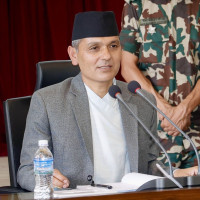- Friday, 20 February 2026
Poor Leadership Cripples Public Enterprises
Of the 45 public sector enterprises (PSEs) operating in Nepal, 17 are running at a loss. In Fiscal Year 2023/24, the public enterprises in the industrial, commercial, public utility, service and financial sectors earned a net profit of Rs. 42.63 billion. But the top five profit makers – Nepal Oil Corporation, Nepal Electricity Authority, Nepal Telecom, Citizen Investment Trust, and Deposit and Credit Guarantee Fund – make almost 84 per cent of this profit, while the rest made a combined profit of Rs. 6.94 billion.
Meanwhile, other offices performing general administration tasks have long been failing to provide timely service and meet public expectations, which has contributed to increasing public frustration and decreasing the credibility of the state. Administrative offices and state-owned enterprises seem sluggish. While multiple reform plans and strategies have been announced, their implementation remains rather pathetic.
Management failure
The miserable state of PSEs results from management failure, which is due to incompetent, inefficient, and visionless leadership. Many of the public sector companies are on the verge of going belly up because of direct political interference in the appointment of the managers and the vested interests of regulating bodies in micromanaging the business or industrial entity. The terms of reference of the job or qualification criteria are bent to present the lucrative posts to the henchmen of certain leaders. The managers, who snatch the positions from deserving candidates through their political connections, have less to do with the prosperity of the institution.
They create an island for themselves and always remain in a coterie of 'yes men'. They live in an ivory tower and look down on the subordinates and 'foot soldiers' who struggle hard to take the enterprise on the path to success. This type of manager tends to show their allegiance to their political masters, remain indifferent to the career growth and capacity building of the staff of the organisation, and ignore the customer and market interests and business growth. However, they might exhibit a sort of loyalty to the trade unions affiliated with their respective political parties at the cost of the overall organisational benefits. Political patronage has become the largest bane of the PSEs in Nepal.
These managers can never be true leaders; instead, many of them end up becoming power brokers at their level or fundraisers for their political masters and parties. They are risk-averse and are myopic in terms of organisational or business transformation. Their lack of knowledge about the business and products of the enterprise, innovations in the sector, and the status of competition in the market sustains the fear of taking any risks. This is the era of global competition, and any company or product has to either compete at the international level or face the influx of international products in the domestic market, or experience both.
These challenges demand that the managers of the PSEs possess knowledge and expertise in marketing, human resource management—with the capability to find and develop talent within and outside the organisation—collaboration and cooperation with different stakeholders of the business, and the ability to work on both short- and long-term strategies. But the managers in the PSEs are initially overconfident about solving the challenges in the enterprise, simply because they have connections with high political offices. In reality, it doesn't happen. Decisions should come through a due process defined by laws, which bar the ambitious managers, many of whom have been parachuted into the organisation and feel alien throughout their tenure, from making decisions haphazardly.
Even their political masters suggest that they must not go beyond the legal framework. Those who are catapulted to the post for the first time find themselves ping-ponged between Singha Durbar and their workstation. Some managers just have the posts but lack the decision-making authority. They can't solve the problems of their staff and customers. If a leader doesn't have the right and power (resources included) to solve the challenges faced by the subordinates, he or she bears no authority to direct them to put in additional efforts for exclusive results. Meanwhile, many of the PSEs are headed by acting chiefs.
Assigning the 'acting' post instead of full-fledged responsibility for the job might have repercussions on the confidence and decision-making ability of the manager. Several such enterprises have had 'acting' chiefs for the last many years who are not fully satisfied with their job title but carry out the day-to-day responsibilities while not taking initiatives for long-term business growth and solutions. Many of the PSEs, therefore, lack O&M policy and strategy, hindering healthy organisational growth.
Pain points
To make the PSEs more competitive, sustainable, and economically rewarding, managers should be ready to hear from the foot soldiers – the lower rung of employees – and address the pain points at various levels. The power of communication should not be ignored, as it is not only useful in mapping the environment in an organisation and building rapport with the entire team, but also in finding the pain points, managing resources, and solving problems. Effective communication within and outside the institution can also help find new insights, navigate through complexities, and address conflicts.
Having said that, the ultimate basic requisite to have good leaders in PSEs is to bring in the managers who match the requirements of the post and can fulfil the demands of the market. One should always be reminded that serving the consumers is the ultimate goal of the company they are leading. Failing in this objective means failing on every front.
(Dhakal is a journalist at this daily. @ModDhakal)














